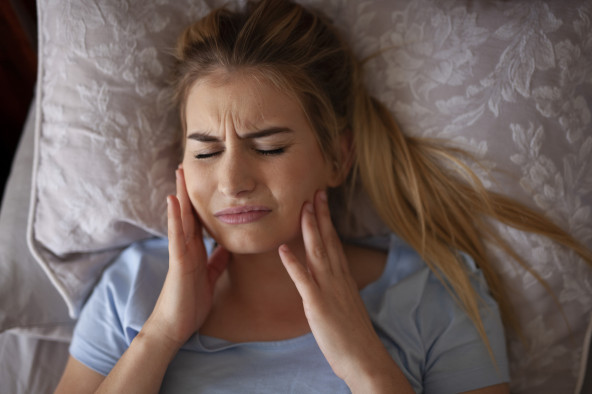What is Bruxism?
What Bruxism means
Bruxism is a mysterious condition that affects many people throughout their lives. While you may not be familiar with the term, it simply refers to what we commonly call teeth grinding. In fact, teeth grinding can even occur in babies whilst in utero, furthering the mysterious nature of this particular dental condition.
Also known as nocturnal bruxism, this medical term is used to describe the act of clenching and/or grinding your teeth while you are asleep. An estimated eight percent of all adults grind their teeth, and up to a third of parents report that their children would occasionally grind their teeth at night also. Occasional grinding is not much of a problem, but when it happens regularly it can cause tooth pain, facial pain and disturb your sleep.
Read on to find out more about why Bruxism is thought to occur, what the symptoms of the condition are, how to prevent it, and how to treat it.
Why Bruxism happens
Recent research suggests that teeth grinding might occur in order to help sufferers breathe.
When the brain drifts into deep sleep, doctors have found that the jaw becomes heavy and creates airflow blockage. What the tongue is doing at this time is expanding to almost twice its size, which is an added obstacle for air to enter the breathing pipe.
Researchers who studied people with partially blocked airways noticed the grinding of their subjects teeth. The grinding of the teeth helped to move the tongue and allow for air to enter the airway. In short, grinding gets the sleeper breathing again.
What are the symptoms of Bruxism?
One of the first signs of nocturnal bruxism is that your teeth feel sore or sensitive. While you will most likely be the first to identify the issue, your dentist will also notice wear or damage to your teeth.
The wear pattern from bruxism is much different from the wear pattern that can be found from everyday chewing. The wear on your teeth from bruxism may be limited to only a few teeth or even to one side of your mouth. Wear from chewing is more evenly distributed.
The Bruxism Association suggests you may notice other symptoms as well, such as:
- Headache – Bruxism sufferers are three times more likely to suffer from headaches.
- Facial myalgia (aching jaw & facial muscles)
- Ear ache
- Tightness/stiffness of the shoulders
- Limitation of mouth opening
- Sleep disruption
- Sleep disruption of bed partner due to noise
- Excess tooth mobility
- Inflamed & receding gums
Meanwhile, some of the longer term complications can be more troublesome:
- Temporomandibular Joint Disorder (sometimes called TMJD or just TMJ)
- Tooth wear & breakage
What are the complications of Bruxism?
While Bruxism can be beneficial to a sleeper who can’t breathe, it also has the potential to harm those afflicted if it persists long term.
Bruxism can aggravate the Temporomandibular joints also known as TMJ. This could lead to tightness, pain, earaches and headaches.
Severe grinding can also sand off enamel on your teeth that can lead to tooth decay and deterioration of dental work.
All these issues can lead to tooth sensitivity.
Further to this, given the research on nocturnal bruxism representing your body’s effort to open restricted air flow while you sleep, sufferers may want to speak with their family doctor about a sleep study. Studies have linked nighttime jaw clenching and teeth grinding with sleep apnea. The grinding could be your body’s way of compensating for a sleep disorder. Treating the sleep disorder could reduce or eliminate the nocturnal grinding and clenching.
How to treat Bruxism
To treat the damage to your teeth from Bruxism, your dentist may be able to repair the enamel with a composite resin. You may also find that your fillings become damaged, requiring them to be replaced.
To prevent further problems from occurring, your dentist may also recommend a night guard. This dental appliance is a custom fit acrylic mouthguard that will fit over your teeth. Additionally, a night guard can also reduce the strain on the muscles of your jaw and reduce your jaw and facial pain.
Mouth guards and splints work to evenly distribute the pressure across your jaw and create a physical barrier between your upper and lower teeth, protecting them from further damage. They can also reduce grinding noises you might have begun making during your sleep.
Mouth guards are similar to those used in sports such as boxing or rugby. They’re rubber or plastic and can be made by a dentist to fit your mouth. While you might choose to buy a mouth guard from a pharmacist, it’s unlikely to fit as well as a custom-made one.
How to stop Bruxism
After a visit to the dentist for treatment, sufferers tend to question how they can stop their Bruxism from occurring. While the exact causes of this disorder are not fully understood, studies have linked nocturnal bruxism with anxiety and stress, as well as alcohol use, cigarettes, and caffeine. Therefore, some suggestions for prevention lay with the sufferer looking inward on their overall health.
According to the NHS, if your teeth grinding is stress-related, it’s important to try to relax and get a good night’s sleep. There are a number of things you can try to help you wind down before you go to bed, including:
- yoga
- deep breathing
- massage
- reading
- having a bath
- listening to music
There have also been connections made to sleep apnea and snoring.
Additionally, some medications can also contribute to nocturnal bruxism. However, nocturnal Bruxism is not known to be caused by psychological or psychiatric issues.
Think you are suffering from Nocturnal Bruxism?
Based in Newcastle NSW, here at Morrin Dental we are dedicated to providing quality dental care for you and your entire family. Contact Morrin Dental for general, cosmetic and preventive dentistry.
